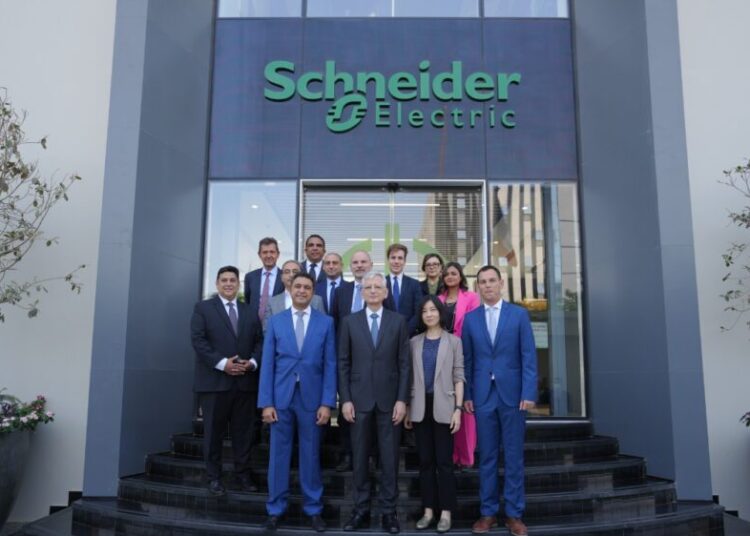Schneider Electric has announced the grand opening of its newly renovated regional headquarters in New Cairo, serving Egypt, North East Africa and Levant (NEAL) in the presence of HE Marc Baréty, the French Ambassador to Cairo and Charise LE, Schneider Electric’s Chief Human Resources Officer.

The inauguration takes place nine months after LEED Gold Certificate for the Best Smart Design (Leadership in Energy and Environmental Design) v4 Interior Design and Construction: Commercial Interiors rating system, issued by the US Green Building Council (USGBC).
Accompanying HE Baréty on the tour of the premises and the innovation hub were Schneider Electric’s top officials including, Charise LE, Chief Human Resources Officer, Eng. Walid Sheta, Zone President, Middle East and Africa as we all Sebastien Riez, Cluster President, North East Africa and Levant.
HE Marc Baréty expressed how pleased he is in witnessing the opening of the fully equipped headquarters of one of the French leading companies, Schneider Electric in New Cairo stating: “I’m certain that the innovation hub will create a paradigm shift towards achieving more sustainable practices and technologies, aiming to enhance the global efforts to achieve the sustainable development goals locally, regionally and internationally.

The innovation hub is a showroom to test the technological products, experiencing the new world of energy powered by Schneider electric’s innovations. These products enable Schneider Electric’s mission to make energy safer, more reliable, efficient, sustainable, and connected.
Eng. Walid Sheta, Schneider Electric’s Zone President explained that Schneider Electric’s headquarters is a model that can be followed by companies that are interested in the construction of smartly designed buildings. Highlighting that: “The innovation center with its progressive technologies is a structure used to welcome users into the advanced technological world, giving them the real feel of our energy powered solutions. I’m proud to announce that the renovated headquarters is a successful model facilitating our mission in achieving our sustainability goals.”
‘Schneider Electric’s headquarters is built according to the standards of a healthy, high-efficiency, and cost-effective green building. As an outcome of implementing these standards, it ensures a better-performing climate for employees’ safety and well-being. Part of our ongoing well-being philosophy is to build a company with joint responsibilities between us and our leaders and employees, this includes the holistic view of the physical, mental, emotional and social well-being, to generate the best performance, creating a safe, secure and engaging work environment,’ said Christie LE, Executive Vice President – Global Human Resources at Schneider Electric.
‘With the continued ramp-up of our operations and in line with the national strategy and our continuous efforts we plan to continue investing in the NEAL cluster, with it being one of the largest regions for Schneider Electric in terms of presence, number of employees and people. One of the important steps this year is the unveiling of the renovated headquarters in Egypt, with all its solutions to underline us as an impact company making a difference and raising the bar with our ongoing 2025 sustainability commitments. This was why Corporate Knights ranked Schneider Electric as the World’s Most Sustainable Company in their Global 100 ranking in 2021’ said Sebastien Riez, Regional Cluster President, North East Africa and Levant at Schneider Electric.
It is worth mentioning that last January, Schneider Electric’s headquarters in New Cairo received the Gold Award for the Leadership in Energy and Environmental Design “LEED v4” system, as the Best Smart Design and Construction: Commercial Interiors rating system awarded by the U.S. Green Building Council for features of green building and sustainability.
Schneider Electric’s Cairo headquarters is the first of its buildings in the Middle East and Africa to receive such credit since the launch of the LEED v4 certification standards in 1998. The award is known to be the most widely used green building rating system globally.






Discussion about this post